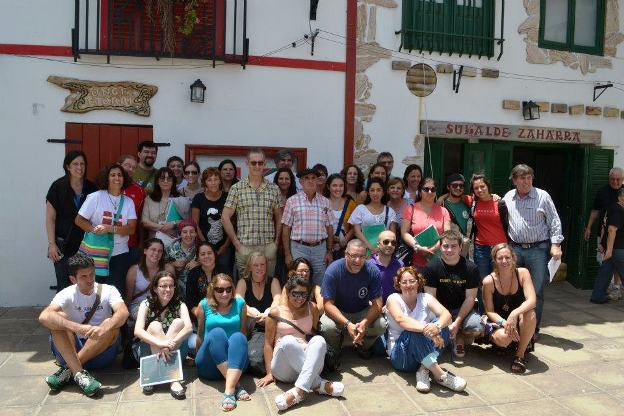basque heritage worldwide

01/23/2013

ADVERTISING
San Nicolas, Argentina. The last group of professors trained by the Euskara Munduan program did so between 2008 and 2012 with excellent results, as was proven by their accreditation exam scores that they took in October in Buenos Aires.
The chain, however, is not broken and so a new cycle began in the New Year that will take place between 2013 and 2016. The new group of students that are training to be Basque teachers includes 27 people from the following countries, city and Basque clubs:
ARGENTINA
-Iara Ulacia (Zingirako Euskaldunak, Chascomus)
-Mariana Grande Cobian (Euskaltzaleak, Buenos Aires)
-Sebastian Amaya (Eusketxe, Buenos Aires)
-Cecilia Elena and Mariano Silva Torrea (Colectividad Vasca, Concordia)
-Gabriela Aguirre and Maria Noemi Armendariz (Gerora, Cordoba)
-Rocio Marialis Miranda (Eusko Etxea, Corpus Christi)
-Aldana Nerea Ariznabarreta (Denak Bat, Mar del Plata)
-Maria Begoña Tisera (Euzkal Etxea, San Nicolas)
-Maria Valeria Oyarzabal (Zelaiko Euskaldunak, Santa Rosa)
-Vanesa Andrea Bauer eta Ines Olazabal (Gure Etxea, Tandil)
-Silvio Alfredo Laborde (Hiru Erreka, Tres Arroyos)
BRASIL
-Maite García Alava (Eusko Alkartasuna, Sao Pablo)
-Maria Madalena Silva Alves de Ataide and Thiago Imperatriz Barros Pereira (Eusko-Brasildar Etxea, Sao Pablo)
CHILE
-Christian Etxeberria and Arantxa Irizar (Euzko Etxea, Santiago)
-Camila Andrea García Galvez and Carolina Andrea Andonaegui Arancibia (Eusko Etxea, Valparaiso)
URUGUAY
-Maria Gloria Zuazola Castro and Paola Rossano Ampo (Euskal Erria, Montevideo)
-Andrea Monica Garcia (Euskaro, Montevideo)
-Maria Laura Moreno Sasiain (Haize Hegoa, Montevideo)
-Maria Angela Juanena Beraza and Maria Noel Arrua Piccion (Euskaldunen Taldea, Salto)
Goal of current barnetegi
Kinku Zinkunegi, technician at HABE, and director of the Euskara Munduan program explained to EuskalKultura.com that “this is the first group created since the World Congress of Basque Collectivities in 2011. Regarding their objectives, in Argentina and Uruguay we can say that teacher training is guaranteed. The idea in this case is to provide what is lacking". "The main goal of this new step is to incorporate new countries. And in respect to this I must say that communication has not been easy at all. For those who have never participated in a project like this it is sometimes difficult to understand the premise, even though we have sent an invitation and the corresponding information. Some countries are interested, as in the case of El Salvador, Venezuela, Peru and Colombia, Medellin…but finally it was harder than we thought to select someone (student/future teacher) to send and understand what this means". "For this reason, we will try to find another way to communicate, in the meantime, we would like these people to join the group for March, when the remote teaching begins, and then they will be part of the new cycle,”he explained.
About the barnetegi, it started last Saturday, coinciding with the meeting of FEVA’s board of directors at the local Basque club. Even if some of the students had some prior Basque knowledge, for many it was the first contact with the Basque language and attempt to learn it. For this reason, it was very important that some face to face classes be offered, so that they can have contact with others who they will be working with over the next four years, as well as the warm welcome that they were given by authorities and members of the hosting Basque club.
“Previous experience has encouraged us, and has assured us that this works and that we should continue. In fact, we are already halfway through the barnetegi and the atmosphere is unbeatable. We also noticed that people who have started are young, that is relevant, and that it is a very dynamic group. Even if the goal of the meeting is to start learning Basque, we also intend to continue to build, and integrate so that it is easier to continue learning at home. Additionally, the group of teachers (Gabriela Mendia, Natalia Hormazabal, Sabrina Otegui), are also very good and the welcome from the Basque club was excellent,” highlighted Zinkunegi.
The Drums of Donostia in San Nicolas
If language of a people is part of their culture, there is no doubt today that to learn a language, and then teach it, it is imperative to immerse oneself in the history, customs, and reality that surrounds it. This can be difficult for some, since the Southern Cone is more than 10,000 kilometers from the Basque Country. Nevertheless new technologies help tremendously in this aspect, shortening distances, or making them disappear.

[Without rain, and at another temperature, the Tamborrada was also Heard in San Nicolas (photo EuskalKultura.com)]
On Saturday January 19, at 20:00, Midnight in Donostia, future teachers were able to follow the start of the San Sebastian Day festivities live, thanks to the internet. Using the Donostia Tamborrada as a model and directed by Miren Arozareana and Gabriela Mendia, their first barnetegi ended singing and playing the San Sebastian March.
ADVERTISING
ADVERTISING
ADVERTISING
ADVERTISING
ADVERTISING
© 2014 - 2019 Basque Heritage Elkartea
Bera Bera 73
20009 Donostia / San Sebastián
Tel: (+34) 943 316170
Email: info@euskalkultura.eus